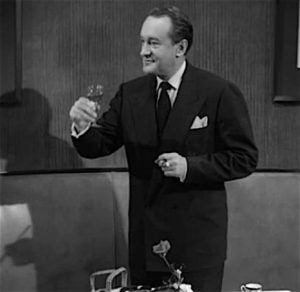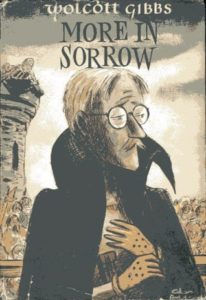Perhaps more than any other American classical musician of her generation, she did her best to communicate to ordinary Americans the idea that the making of high art is a normal human activity, one whose fruits are accessible to all who make a good-faith effort to understand them. That’s not quite true, of course, but it’s a noble and ennobling lie, and I wouldn’t be greatly surprised if Beverly Sills is remembered for telling it long after the particulars of her performing career are forgotten….
Read the whole thing here.



 I’m sorry, too, since I always go to the theater in the hope of enjoying myself. That said, I confess to finding this letter close to incomprehensible, though perhaps “incoherent” is a better word. To the extent that it means anything, the author appears to be echoing Thumper’s father in Bambi, who famously told his child, “If you can’t say something nice, don’t say nothing at all.” That, I assume, is what my correspondent means when he tells me to “support theatre and note your dislikes but don’t broadcast and sow seeds of negativity.” In fact, it’s fairly well known in the business that I tend to err on the side of generosity, especially as regards performers. I believe devoutly in my own
I’m sorry, too, since I always go to the theater in the hope of enjoying myself. That said, I confess to finding this letter close to incomprehensible, though perhaps “incoherent” is a better word. To the extent that it means anything, the author appears to be echoing Thumper’s father in Bambi, who famously told his child, “If you can’t say something nice, don’t say nothing at all.” That, I assume, is what my correspondent means when he tells me to “support theatre and note your dislikes but don’t broadcast and sow seeds of negativity.” In fact, it’s fairly well known in the business that I tend to err on the side of generosity, especially as regards performers. I believe devoutly in my own  I hasten to add, by the way, that I despise gratuitously nasty criticism. It was, for instance, unforgivable of John Simon to describe Liza Minnelli in this way after seeing her in the film version of Cabaret:
I hasten to add, by the way, that I despise gratuitously nasty criticism. It was, for instance, unforgivable of John Simon to describe Liza Minnelli in this way after seeing her in the film version of Cabaret: It is, I hope, clear that I bore no malice of any kind toward her. I deeply regretted having to write this paragraph, as I always do when I feel obliged to write such things. I’m with Wolcott Gibbs, the notoriously waspish theater critic of The New Yorker, who gave the title More in Sorrow to a collection of his reviews. I don’t know whether Gibbs meant it in his heart of hearts, but I really, truly do: I’m on the side of theater, and I hate writing pans. I get no pleasure whatsoever out of it. When I do so, it’s because my job, as I understand it, is to report accurately on what I see and hear—to steer the reader as straight as I possibly can. Sometimes that means I have to say sharply negative things, but I prefer to say strongly positive ones. Any critic who feels otherwise is in the wrong line of work.
It is, I hope, clear that I bore no malice of any kind toward her. I deeply regretted having to write this paragraph, as I always do when I feel obliged to write such things. I’m with Wolcott Gibbs, the notoriously waspish theater critic of The New Yorker, who gave the title More in Sorrow to a collection of his reviews. I don’t know whether Gibbs meant it in his heart of hearts, but I really, truly do: I’m on the side of theater, and I hate writing pans. I get no pleasure whatsoever out of it. When I do so, it’s because my job, as I understand it, is to report accurately on what I see and hear—to steer the reader as straight as I possibly can. Sometimes that means I have to say sharply negative things, but I prefer to say strongly positive ones. Any critic who feels otherwise is in the wrong line of work.
 “The Traveling Lady,” among the most tenderly poignant of the soft-spoken studies of small-town life in which Horton Foote specialized, has had its ups and downs—mostly the latter. It ran for just three weeks on Broadway in 1954. Three years later, Kim Stanley, the star of that ill-fated production, repeated her much-admired performance on TV’s “Studio One,” and in 1965 the play, retitled “Baby the Rain Must Fall,” was unsuccessfully filmed, this time as a vehicle for Steve McQueen. But by then Mr. Foote’s once-promising career was in eclipse, and it wasn’t until years later that he was generally recognized as one of America’s most important playwrights. Now the original stage version of “The Traveling Lady,” judiciously tightened by Mr. Foote from three acts to one for a 2004 revival, is being performed off Broadway in a production directed by Austin Pendleton, who has a knack for making smart things happen in small theaters. He’s done it again: I feel certain that Mr. Foote himself would have delighted in the perfect stylistic unanimity of this lovely revival.
“The Traveling Lady,” among the most tenderly poignant of the soft-spoken studies of small-town life in which Horton Foote specialized, has had its ups and downs—mostly the latter. It ran for just three weeks on Broadway in 1954. Three years later, Kim Stanley, the star of that ill-fated production, repeated her much-admired performance on TV’s “Studio One,” and in 1965 the play, retitled “Baby the Rain Must Fall,” was unsuccessfully filmed, this time as a vehicle for Steve McQueen. But by then Mr. Foote’s once-promising career was in eclipse, and it wasn’t until years later that he was generally recognized as one of America’s most important playwrights. Now the original stage version of “The Traveling Lady,” judiciously tightened by Mr. Foote from three acts to one for a 2004 revival, is being performed off Broadway in a production directed by Austin Pendleton, who has a knack for making smart things happen in small theaters. He’s done it again: I feel certain that Mr. Foote himself would have delighted in the perfect stylistic unanimity of this lovely revival. Scott McPherson’s “Marvin’s Room,” which ran off Broadway in 1991 and was filmed five years later, has made it to Broadway at last. I’m surprised it took so long, since it’s the kind of play that typically goes over big there, a kitchen-sink-and-hospital-room cancer comedy in which all of the characters say cleverish things most of the time. The characters in question include Bessie (Lili Taylor), a dutiful daughter who comes down with leukemia after spending 20 years caring for her (unseen) senile father; Lee (Janeane Garofalo), Bessie’s not-so-dutiful sister, who flew the family coop as fast as she could but now finds herself saddled with a teenage son (Jack DiFalco) who set fire to her house and is now in a mental institution, and…but you get the idea, right? Lots of laughs, lots of jerked tears, very little reality….
Scott McPherson’s “Marvin’s Room,” which ran off Broadway in 1991 and was filmed five years later, has made it to Broadway at last. I’m surprised it took so long, since it’s the kind of play that typically goes over big there, a kitchen-sink-and-hospital-room cancer comedy in which all of the characters say cleverish things most of the time. The characters in question include Bessie (Lili Taylor), a dutiful daughter who comes down with leukemia after spending 20 years caring for her (unseen) senile father; Lee (Janeane Garofalo), Bessie’s not-so-dutiful sister, who flew the family coop as fast as she could but now finds herself saddled with a teenage son (Jack DiFalco) who set fire to her house and is now in a mental institution, and…but you get the idea, right? Lots of laughs, lots of jerked tears, very little reality….